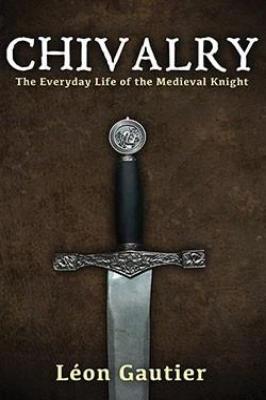

The Everyday Life of the Medieval Knight
CHIVALRY has fascinated Western civilization for over a millennium, from way back when Knighthood was in flower, all the way to present day. Today, this fascination is as prevalent as it ever was, manifesting itself in works such as J.R.R. Tolkien’s The Lord of the Rings. But what IS Chivalry? Is it proper manners (the lack of which, especially toward ladies, is sometimes spoken of as “Chivalry being dead”)? Is it kindness? Steadfastness? It is all of those things, and much more. Leon Gautier, the author of this magnificent book, describes it thusly: “Chivalry is the Christian form of the military profession: the knight is the Christian soldier.” In a word, it is militant Christianity. But this is neither a religion confined to Sunday worship, nor a profession restricted to barracks; nor yet are the religion and the profession at all separate from each other. It is the armed defense of the unarmed Truth. In his work, Gautier leaves no stone unturned, covering every aspect of the knight: his birth, education, marriage, everyday life, battle, and death. He also dedicates several chapters to the code of chivalry, which serves as the ten commandments of knighthood. Let Gautier take you back to a time when Christians had to defend all that they hold dear: their families, their property, their country, and their Faith. Foreword by Charles A. Coulombe.
OUR first intention was to give this volume the more expanded title of Chivalry, according to the Epic Poems, but we have been compelled to consult so many other authorities that we feel obliged to adopt a more general and shorter title.
The Epic Poems (Chansons de Geste) do not the less remain as the principal and the best of all our sources of information; for in them (in our own opinion) we find the truest pictures of Chivalry itself, and the most exact representations of the days of Chivalry. The authors of these popular poems, whose sincerity is unquestionable, only depicted what they actually witnessed. No other writers have so minutely described the costumes, armor, habitations, furniture, the private lives and the manners of the Feudal nobility. Good judges are not easily deceived. There is perhaps not a page of the admirable Glossary of Ducange, or of the Memoirs of Saint Palaye, which does not bear witness to the truthfulness of our songs. Nor does Jules Quicherat hold them in less esteem; he declares in round terms that: “their heroes are creations modeled on Feudal seignors.” Viollet le Duc quotes them as frequently as Ducange. They complete the Annals and the Chronicles, filling in lapses, and adding force to the cases recorded. It is, besides, very easy to assure one’s self that the poets spoke the same language as our historians. This can be substantiated by reading alternately such a Chronicle as that of Lambert d’Ardre and a poem like Ogier.
It will appear to many good souls that our enterprise is rather a rash one, if we reflect how many volumes have been inspired by Chivalry. But we have chosen to produce our book on a new plan, and this view may commend it to competent judges. We have devoted a large portion of the volume to the private life of the period: and have enshrined it in a chronological frame which is not very elastic. We have seldom gone farther back than the time of Philip Augustus, and rarely go lower than his death. Within these limits, as has been truly said, lies the golden epoch of the Middle Ages—and to it we have confined ourselves. The chief fault of works which have preceded this is, in our opinion, the long period included in them, and they do not sufficiently draw the distinction between the Chivalry of the twelfth and of the thirteenth centuries. We hope we have avoided this confusion.
The result of many years of application, this volume has been from all points of view the object of conscientious preparation. The writer has, above all things, striven to be perfectly impartial, and would be the very last person deliberately to lay on color too thickly or to embellish his models. His confessed aim is to bring out the glories of old France, to compel affection by making her known; and, as Guizot says, “to bring her back to the memory, and into the intelligence, of her generations.”
But we conceived another idea, which may appear more daring still: this was to enlarge the mind, to check the mercantile spirit which abases, and the egotism which is killing it: to convey to it some of the enthusiasm for the Beautiful, which is menaced; and for the Truth, which seems to us to be dying out.
There is more than one kind of Chivalry, and lance thrusts are not everything! In default of the sword, we have the pen: failing the pen, speech: and in default of speech, honor, in our lives!
The Author of Chivalry will esteem himself happy if he has created some “knights.”
LÉON GAUTIER.
